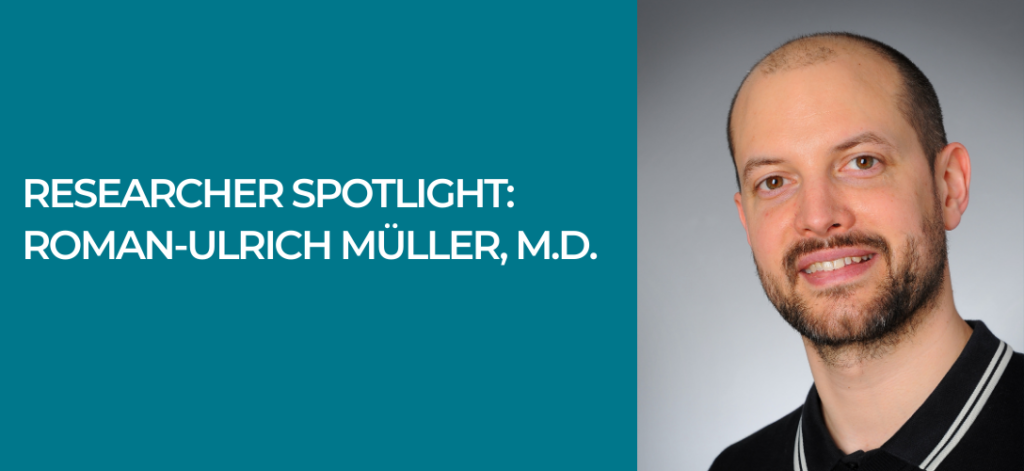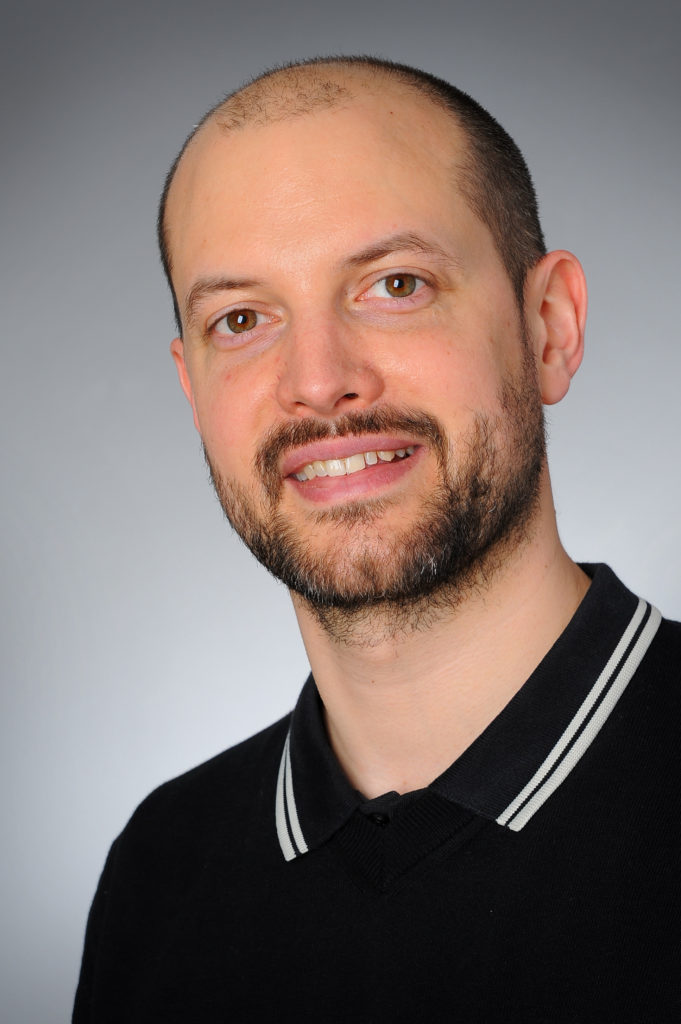
Published on May 4, 2021
Roman-Ulrich Müller, M.D., University of Cologne
How did you first get involved in PKD research?

Roman: In 2004, I spent a part of my scientific training at Rockefeller University (NYC) in the laboratory of Thomas Tuschl. Thomas is an outstanding scientist who pioneered the field of so-called small regulatory RNAs. These small RNAs are molecules that have an enormous impact on gene expression and have a huge therapeutic potential.
Back then, I found that one of these RNAs (a member of the microRNA-17-92 family) was a regulator of PKD1 (later published in the Journal of Molecular Medicine, 2013), the gene most commonly affected in ADPKD. Together, with the clinical importance of PKD which I learned about in medical school at the University of Freiburg (Germany), this finding raised my interest in PKD research.
This interest was also the reason why we started to set up a large prospective cohort study at the University of Cologne (AD(H)PKD) to enable clinical research in PKD. More than 800 patients have now contributed to this initiative. We’re very grateful for this opportunity to lay the foundation for further advances in the PKD field.
What are you working on currently?
Roman: On the one hand, we’re continuing our work on the molecular mechanisms of cyst formation in PKD in the laboratory. On the other hand, and most importantly, we’ve started translating basic research results from the bench to the clinical trial setting with a focus on dietary interventions. This initiative is based upon findings by the group of Thomas Weimbs in Santa Barbara, with whom we closely collaborate on this topic. He found that simple diets which mimic fasting profoundly inhibit the growth of kidney cysts in animals with PKD. These diets induce the state of “ketosis” that allows fat reserves to be used for energy instead of blood sugar.
Based on these findings, we’re currently running two clinical trials that examine ketogenic dietary interventions in ADPKD—RESET-PKD (NCT04472624) and KETO-ADPKD (NCT04680780). KETO-ADPKD was enabled by a grant from the PKD Foundation and tests two well-established diets that induce ketosis: (1) fasting and (2) a high-fat/low carb ketogenic diet. ADPKD patients will be treated with either diet for three months to find out how well they tolerate these diets, how safe they are, and if they have an impact on kidney volume.
The results will be crucial for the design of a subsequent trial to test whether one of these diets slows disease progression in the long term in a much larger number of ADPKD patients.
What would you like the patient community to know about your research?
Roman: PKD is a disease that comes with a considerable burden for most of the affected patients. For many decades, treatment of PKD was limited to supportive measures. However, the last decade has changed the situation regarding PKD research and emerging therapies a lot. With tolvaptan, the first targeted treatment for ADPKD became available. Tolvaptan doesn’t cure the disease, it only slows down kidney function over time. Consequently, additional therapeutic strategies are an important aim. Fortunately, there are a number of different candidate drugs that are actively studied in clinical trials and we’ll learn more about their effect over the next years.
Importantly, however, we’re only just learning that treatment of PKD is probably not limited to pharmaceutical strategies. It’s clear that a healthy lifestyle (e.g., maintenance of normal body weight) plays an important role as well and nutrition (e.g., ketogenic diets) may actually be a powerful tool to ameliorate disease progression. It’ll now be of utmost importance to study such approaches in clinical trials in order to confirm efficacy and safety in humans.
Do you have a personal connection to PKD?
Roman: None of my family members or close friends are affected by PKD. However, if you take care of a large number of PKD patients as their medical doctor, the connection to this field, to the challenges the disease poses to affected persons, and the feeling of a need for therapeutic options, do indeed get quite personal.
What excites you most about this research?
Roman: Translational research is absolutely fascinating to me. Linking cellular biology with metabolic changes and designing tools for how to target these changes for the treatment of human disease in one research pipeline, and in collaboration with outstanding colleagues, is a wonderful task.
What are some of your personal interests outside of research?
Roman: I love learning new things, both in and outside of work. Outside of research, traveling to see new places in the world and getting to know people and their cultures is one of my favorites. Let’s hope we’ll all get through the current difficult situation with COVID-19 soon to make interactions (both scientific and personal) around the world possible again.
Anything else you’d like to share?
Roman: I’m deeply convinced that the close interaction between patients, doctors, scientists, and patient advocacy groups is an important piece in the puzzle toward improved PKD management in the future.
Check out Dr. Roman-Ulrich Müller’s grant and others funded by the PKDF here!
The PKD Foundation is the largest private funder of PKD research in the U.S. Since 1982, we’ve invested over $50 million in more than 1,300 research, clinical and scientific grants, fellowships, and scientific meetings. Each year, the Foundation identifies and supports the work of scientists and researchers from around the world who look for ways to treat and eventually cure PKD. Our vision is to #endPKD. Donations fund necessary research that leads to more effective treatments and ultimately a cure for PKD.









My mum had pkd the rare liver one had when alive two thirds removed younger sister has been diagnosed i diagnosed 27 years ago with type 2 diabetis brittle asthma ibs this last one can have bad flare ups been told by doc i definatly no pkd still can have concerns of all my different symptons too
Thank you for all that you do in your research to help PKD patients.
Thanks- i would like to know the results of the studies in humans. I always read a high protein diet was hard on the kidneys.
The first results from a small human pilot trial (RESET-PKD) will probably get available at the end of this year; the actual KETO-ADPKD trial will run until mid 2022. If you contact us by email (nephrologie-adpkd@uk-koeln.de) to provide contact information we can try to keep you in the loop.
The diet they are promoting in a low to moderate protein diet and mostly plant based. The ketogenic diet is high in fat but just maintenance for protein. That is a common misconception
Thanks, Kristan. This is correct. The diets we examine are not protein-rich.
The diet is high fat with normal, low or moderate protein. All of these are options. I thought the same thing when I heard about the keto diet the first time.
Rrally interested in the research. I myself have PKD and cysts on my liver.
Hi, it gives us a hope that i may live longer… In my family i lost my father and three elder brothers because of pkd… All are between 45 and 53 age… Now i am at 45 and i am counting my years… May be another 7 or 8yrs… But this news really gives me a hope… Thanks and i would like to know progress of this…
I see several of these trials are focused on PKD1-related PKD. I wonder if animal models and/or upcoming safety/efficacy trials will also be inclusive of those with PKD2-driven disease.
I have actually been intermittent fasting for months and didn’t know it might be a help to my PKD. I was doing it because I read of other health benefits. Crossing my fingers it does benefit me with PKD too!
I shrinked 30% my left kidney and 20% the right one after only 40 days of following the diet advice of the facebook group but with a lower intake of meat than they suggest: https://www.facebook.com/groups/610558479091161/
I recommend you join and read if you are interested.
Good for you! That is wonderful news!
We are so grateful for your indebted service to finding a cure for PKD… Us who have PKD… Have so much admiration for you scientists and doctors who care so deeply for finding a cure for all of us that have suffered with it.
I Would like to participate in this research. I have PKD.
If you’re interested in more information and updates on the topic you are welcome to get in touch with us. Contact information regarding the individual trials is available on clinicaltrials.gov; e.g. for RESET-PKD, search for the trial ID NCT04472624
me gustaria participar en la investigacion tengo PKD, con quistes en higado y riñones, y calculos renales. aun sin presion alta, pero ya con nivela de filtracion de 28
soy todo un caso.. llevo una dieta baja en proteinas, no tengo diabetes, ni ninguna otra enfermedad solo PKD
Comment Congratulations for your work. I have polycystic kidney disease (new onset) (first case) I am writing to you from Spain, I would like to receive your help. Thank you so much